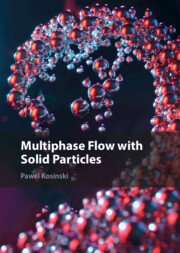Book contents
- Frontmatter
- Contents
- Nomenclature
- 1 Basic Concepts and Scope of the Book
- 2 Flow of a Single Particle
- 3 Introduction to Contact and Impact Mechanics
- 4 Tangential Contact
- 5 Adhesion
- 6 Coefficient of Restitution
- 7 Heat Conduction between Particles
- 8 Hard-Sphere Model
- 9 Discrete Particle Simulations: A Summary of the Model
- 10 Multiphase Systems
- References
- Index
6 - Coefficient of Restitution
Published online by Cambridge University Press: 05 October 2023
- Frontmatter
- Contents
- Nomenclature
- 1 Basic Concepts and Scope of the Book
- 2 Flow of a Single Particle
- 3 Introduction to Contact and Impact Mechanics
- 4 Tangential Contact
- 5 Adhesion
- 6 Coefficient of Restitution
- 7 Heat Conduction between Particles
- 8 Hard-Sphere Model
- 9 Discrete Particle Simulations: A Summary of the Model
- 10 Multiphase Systems
- References
- Index
Summary
One of the parameters that describe particle-particle collision is a coefficient of restitution. This can be simply defined as a ratio of the post-collisional and pre-collisional relative velocity. This chapter is devoted to this topic. As it is straightforward to measure this parameter experimentally, different practical techniques have been used by the researchers, and they are depicted here. Factors such as material properties and pre-collisional conditions are discussed, and it is shown how they influence the value of the coefficient of restitution. It is worth noting that the coefficient of restitution can also be found theoretically by exploiting the relationships previously discussed in the book, especially in Chapter 3. This is described in detail in this chapter. The chapter therefore returns to the previously considered mathematical models. Finally, the chapter concludes with two additional sections focusing on special cases: collisions of granules and nanoparticles., respectively. These particular types of particles have unique features that greatly influence the collision process and restitution coefficient.
Information
- Type
- Chapter
- Information
- Multiphase Flow with Solid Particles , pp. 139 - 169Publisher: Cambridge University PressPrint publication year: 2023
